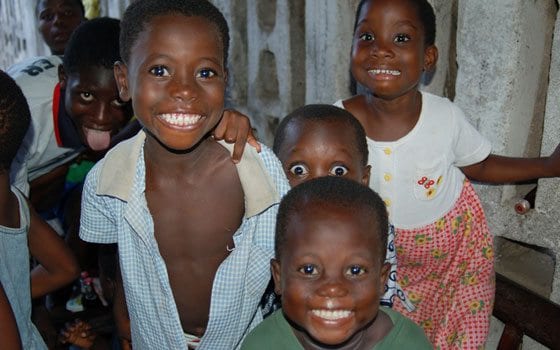

Author: Simmons CollegeChildren in Ghana smile for the camera.
Obiageli Ukadike is soon graduating from Simmons College with a MBA degree.
She is equally passionate about recently winning the Silverman Business Plan Competition for her project to aid and educate disabled children in Ghana.
Called the WaWa Project, it will be based in the southern region of Ghana, in Suhum, and will offer temporary housing and robust education programming. When finished, the founders hope the children will be self-reliant, independent individuals who become positive, active and contributing members of a community, according to its mission.
Named after the wawa adinkra symbol of the Asante people of Ghana, wawa aba literally means the “seed of the Wawa tree.” The seed is extremely hard and symbolizes toughness and perseverance, according the organization’s website.
“We’re so excited about the name,” said Ukadike. “In Ghana, people with disabilities are discriminated against. People born with disabilities are looked at as a disgrace. They’re treated as though they’ve done something wrong. “We’re trying to change that. Being made better through hardship is our brand.”
One thing is clear. The WaWa Project has received a major vote of confidence.
The Silverman competition, started in 2006, is solely for female entrepreneurs. As part of the competitive process, participants are paired with faculty advisors who assist them with various aspects of new business creation, such as financial statement development and market outreach.
They also gained access to established entrepreneurs, venture capitalists, angel investors, bankers and attorneys. The winner gets $10,000 to help fund the venture.
In addition to the cash prize, the organization also gets incubator space and continued advisory support.
“I have a commitment to all ten of the women (semi-finalists),” said Dr. Teresa Nelson, director of the Entrepreneurship program at Simmons. “I’m available as an advisor even after they graduate. But, the winner gets time with a CEO for advice and is given office space for a year.”
This is the first year that a nonprofit organization won the award. The group entered the competition last year and made it to the semi-finals. This year, they tried again after tweaking their presentation.
“It’s a long process,” said Ukadike. “We had to revisit our business plan, come up with balance sheets, income statements and executive summaries. We’ve also taken entrepreneurship classes.
“In preparation, we tailored our talk about the organization. We needed people to know that we were serious. If you’re just another bleeding heart that wants money, nothing will happen.”
From 1999 to 2009 the number of registered 501(c)(3) public charities in the United States increased by 59.3 percent. The number of 501(c)(3) private foundations jumped by 54.7 percent, according to the National Center for Charitable Statistics.
As the economy struggles to recover, founders and heads of nonprofits need to consistently find innovative ways to raise money.
“Corporations and nonprofit organizations are the same [in that] they both need to figure out ways to fund themselves,” Nelson explained. “In the competition we were looking for sustainable and scalable growth.”
Nelson also pointed out that nonprofits have a particularly tough battle during rough economic times.
“When the economy is in trouble,” Nelson explained, “charitable giving is the first thing to go. I always advise non-profits to have a for-profit arm.”
It’s an exciting time for the three founders of the WaWa Project: Ukadike, director of Programs and Development; Marisa Galeota, director of Marketing; and Bridget Koha, executive director.
After winning the competition, the trio hosted their inaugural gala that raised an additional $7,000 for the project.
“We’re aiming to officially launch in a year, September 2012 or at the latest the end of 2012,” Ukadike said. “I’d love for this to be my full-time job. Right now, I’m working at Harvard Medical School. In five or six years, I plan to move to Ghana.”






